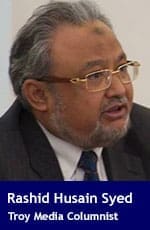 Germany is stuck between a rock and a hard place.
Germany is stuck between a rock and a hard place.
On the one hand is its decision to limit crude and gas imports from Russia. On the other, its industrial might is under threat. Berlin’s political decision to limit gas imports from Russia has thrust the country into its biggest energy crisis since the Second World War.
Cheap energy supplied by Russia has been instrumental in keeping German exports competitive. Before Putin’s war against Ukraine, Russia met almost 55 percent of total German gas imports. That is now in jeopardy.
If those Russian energy supplies come to a halt for any reason, the German economy could come to a standstill. Thousands of German companies, big and small, would go bankrupt, according to a recent report by Eric Reguly in Globe and Mail. This would lead to hundreds of thousands of Germans being jobless, initiating a recession of unimaginable proportions. The situation is getting scarier by the day.
 |
| Related Stories |
| Oil once again being used as a political tool
|
| Canada must begin to export green energy natural gas to Europe
|
| Europe is counting on natural gas from Canada |
“If the crisis endures – Germany is preparing for possible energy rationing and rolling blackouts as winter approaches – the government might have to rethink the country’s entire economic model, which has centred for decades on delivering massive amounts of subsidized energy to heavy industries such as chemicals and steel,” Reguly wrote in the Globe and Mail.
In the early days of Putin’s war on Ukraine, there were already murmurs in Berlin that Germany would pay a steep price if it stopped buying oil and gas from Russia. But Chancellor Olaf Scholz and Robert Habeck, the German minister of Economics and Climate Protection, apparently gave in under pressure from U.S. President Joe Biden and NATO.
Berlin is moving ahead on its chosen path. On Friday, it announced it is taking control of three Russian-owned refineries in the country to ensure energy security before an embargo on oil from Russia takes effect next year. The Economy Ministry stated that Rosneft Deutschland GmbH and RN Refining and Marketing GmbH would be put under the administration of Germany’s Federal Network Agency.
By taking control of the sites, the German authorities are signalling that they will continue to run the refining operations by using crude from countries other than Russia once the ban on Russian crude kicks in. Rosneft had previously made clear it had no intention of ending the import of Russian oil despite a looming EU embargo coming into force on Jan 1, 2023.
Moscow has warned of the grave consequences of implementing such a policy. “Putin will make people choose between heating and eating this winter,” screeched a headline in the New York Times. And last Friday, Putin, underlining that Russia had nothing to do with Europe’s energy crisis, insisted instead that “if the European Union wanted more gas, it should lift sanctions preventing the opening of the Nord Stream 2 pipeline.”
Speaking to reporters after the Shanghai Cooperation Organisation summit in Uzbekistan, Putin bluntly declared: “The bottom line is, if you have an urge, if it’s so hard for you, just lift the sanctions on Nord Stream 2, which is 55 billion cubic metres of gas per year, just push the button and everything will get going.”
Opposition to the boycott of Russian energy supplies is rising, with leading left-wing German politician Sahra Wagenknecht slamming her government for causing a ‘fatal’ economic war with Russia.
Germany’s government is the “stupidest” in Europe for managing to embroil itself in a full-blown “economic war” with its top energy supplier, media reports quoted Wagenknecht as saying on Thursday. Speaking in the Bundestag, the former co-chair of the party Die Linke (The Left) urged an end to anti-Russian sanctions.
While describing the ongoing conflict in Ukraine as a “crime,” Wagenknecht said the anti-Russian sanctions are “fatal” for Germany itself. With energy prices out of control, the country’s economy will soon “just be a reminder of the good old days,” the MP warned, as she urged cancelling the restrictions and engaging in talks with Russia.
The tug of war will continue, with energy being used as a bargaining chip. But there is a growing awareness in Europe that Russia is not a reliable partner as far as energy supplies are concerned.
And this awareness carries a lot of weight with the German government.
Toronto-based Rashid Husain Syed is a respected energy and political analyst. The Middle East is his area of focus. As well as writing for major local and global newspapers, Rashid is also a regular speaker at major international conferences. He has provided his perspective on global energy issues to the Department of Energy in Washington and the International Energy Agency in Paris.
For interview requests, click here.
The opinions expressed by our columnists and contributors are theirs alone and do not inherently or expressly reflect the views of our publication.
© Troy Media
Troy Media is an editorial content provider to media outlets and its own hosted community news outlets across Canada.

